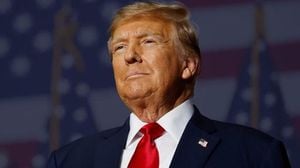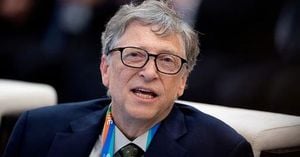The recent events surrounding the University of Michigan have sparked significant controversy and debate, particularly focused on accusations of antisemitism directed at Rachel Dawson, the former administrator for diversity initiatives. The university's decision to terminate her following these allegations has raised questions about free speech, political discourse, and the challenges of maintaining inclusivity on college campuses.
Dawson held the title of director of the Office of Academic Multicultural Initiatives at the University of Michigan. Her abrupt termination followed allegations made during a conference where she allegedly stated comments deemed antisemitic. According to documents acquired through a Freedom of Information Act request, she purportedly made references to the university as being “controlled by wealthy Jews” and characterized Jewish students as “wealthy and privileged” who did not require the services provided by her office.
These comments came under scrutiny from the Anti-Defamation League of Michigan, which filed complaints leading to the university's investigation. The fallout from these accusations quickly escalated, culminating in Dawson's firing, which her attorney claims violates her First Amendment rights. Amanda Ghannam, Dawson’s lawyer, expressed intentions to pursue legal action against the university, arguing the nature of her comments was mischaracterized and did not constitute antisemitism.
This whole incident has highlighted the often-fractured dialogue surrounding race, religion, and identity politics within academic settings. Colleges are considered places of broad discussion and diverse viewpoints, but they also have to navigate the fine line between protecting free speech and discouraging inflammatory rhetoric.
Following the university's actions, Colleen Mastony, spokesperson for the University of Michigan, remained tight-lipped about the specifics of the firing, stating they could not comment on personnel matters. The vagueness of the university’s communication has done little to quell responses from both supporters and opponents of Dawson's termination.
Those defending Dawson see this as part of a broader trend where individuals are dismissed or shunned for expressing views considered controversial or unconventional, raising alarms about the erosion of free speech on college campuses. Critics point to the necessity of creating safe and inclusive environments, particularly for students who may feel targeted or marginalized by discriminatory remarks.
Outcry on social media and within community forums has marred the atmosphere around the university, with varying opinions on how the institution is handling such sensitive matters. Some students have rallied around Dawson, advocating for her right to speak freely and criticizing the university for what they see as overreach and intolerance.
Simultaneously, campaigns against antisemitism have intensified on campus, with advocacy groups pushing for policies and initiatives aimed at creating supportive environments for Jewish students. The students’ responses reflect the divided perspectives on how racism and religious intolerance must be addressed, and where the boundaries should be drawn.
This incident does not stand alone; it is part of larger discussions taking place across the country about the balance of political correctness, freedom of speech, and responsibility. Many universities grapple with similar issues, leading to protests, debates, and sometimes controversial disinvite events, where speakers labeled as controversial are urged not to attend due to their perceived views.
Overall, the University of Michigan’s actions against Rachel Dawson have ignited discussions about how academic institutions can and should respond to allegations of antisemitism and racism, potentially setting precedents for how similar cases will be handled moving forward.



